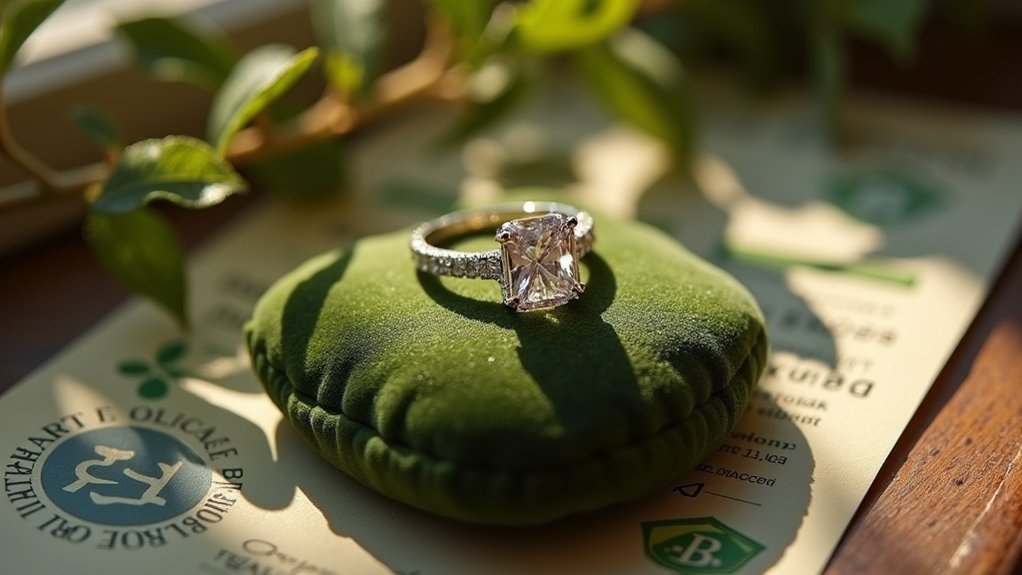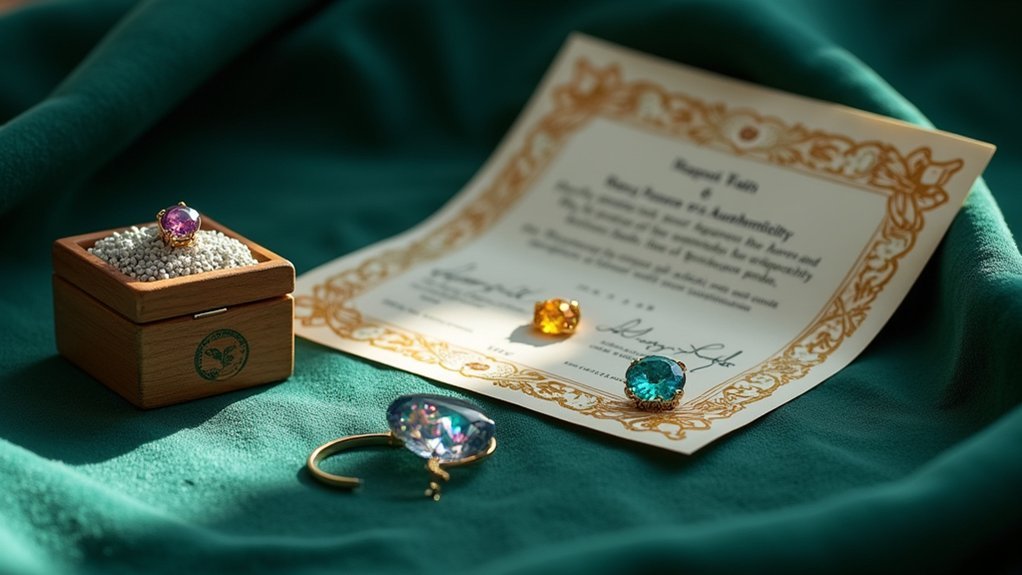When you’re shopping for jewelry, you’ll notice various certification labels that claim ethical sourcing, but not all certifications carry the same weight or standards. Some focus solely on conflict-free diamonds, while others guarantee fair wages for miners or environmentally responsible extraction methods. You might assume these certifications are interchangeable, yet each addresses different aspects of the supply chain—and understanding which ones actually align with your values requires knowing what lies beneath those official-looking stamps.
Understanding Ethical Jewelry Certifications

When you’re shopping for jewelry, ethical certifications serve as your roadmap to responsible purchasing decisions. These certifications verify that brands follow strict standards for ethical sourcing, ensuring precious metals and gemstones come from conflict-free regions with fair labor practices.
You’ll find several key programs like Fairtrade Gold and the Responsible Jewellery Council (RJC) that focus on environmental sustainability and social responsibility. The Kimberley Process prevents conflict diamonds from entering markets, while organizations like Fairmined and B Corps recognize companies meeting rigorous performance standards.
The Institute for Responsible Mining Assurance (IRMA) conducts third-party audits to verify mining practices. These sustainable jewelry certifications provide transparency, helping you make purchases that support ethical initiatives throughout the industry.
Fairtrade Gold Certification Standards
As you explore ethical jewelry options, Fairtrade Gold Certification stands out as the industry’s first dedicated ethical certification system for gold sourcing. This certification guarantees your jewelry comes from small-scale mining operations that prioritize worker welfare through fair wages and safe working conditions.
When you choose Fairtrade Gold, you’re supporting:
- Complete traceability from mine to market, ensuring transparency throughout the entire supply chain
- Sustainable mining practices that minimize environmental harm and protect local ecosystems
- Community development initiatives funded by premiums that invest in education, healthcare, and infrastructure
The certification requires strict adherence to environmental responsibility standards while promoting ethical sourcing practices.
Fairtrade Gold Certification demands rigorous environmental compliance standards alongside comprehensive ethical sourcing requirements for responsible jewelry production.
Mining communities benefit directly from your purchase through fair compensation and improved working conditions, making Fairtrade Gold a powerful tool for positive change.
Responsible Jewellery Council (RJC) Certification

Beyond individual product certifications, the Responsible Jewellery Council (RJC) Certification offers thorough industry-wide standards that transform how jewelry companies operate across their entire supply chain.
When you’re shopping for ethical jewelry, RJC certification signals that brands meet rigorous requirements covering environmental management, labor rights, and business ethics.
You’ll find that RJC-certified companies undergo independent audits to verify their responsible practices. This certification helps you identify brands committed to ethical sourcing while promoting transparency throughout the jewelry industry.
Kimberley Process Certification Scheme
The Kimberley Process Certification Scheme (KPCS) specifically targets conflict diamonds through an international framework that’s been operating since 2003.
You’ll find that this initiative requires participating countries to implement strict regulations and certification processes for rough diamond trade, ensuring ethical sourcing from conflict-free regions.
The certification system operates through three key requirements:
- Transparency standards – Countries must meet minimum requirements for accountability in their diamond supply chains.
- Certification processes – Rough diamonds need proper documentation proving conflict-free origins.
- Compliance monitoring – Participating nations undergo regular assessments to maintain their certification status.
With 81 countries currently participating, the Kimberley Process has increased industry accountability.
However, you should know that reports of non-compliance and ongoing conflict diamonds have prompted calls for system reforms and enhancements.
Fairmined Gold Certification Requirements

While diamonds capture attention through the Kimberley Process, gold mining presents equally significant ethical challenges that Fairmined Gold Certification directly addresses.
You’ll find that achieving Fairmined certification requires miners to meet stringent standards covering fair wages, safe working conditions, and meaningful community engagement. The certification specifically targets responsible artisanal and small-scale mining organizations that prioritize environmental protection alongside social development.
When you choose Fairmined gold jewelry, you’re supporting operations that undergo regular audits and compliance checks to maintain their ethical standards.
This certification guarantees your purchase contributes to sustainable development by fostering economic growth through fair trade practices. You can confidently invest in Fairmined products knowing they positively impact miners’ livelihoods and strengthen their communities.
Institute for Responsible Mining Assurance (IRMA)
When you’re exploring ethical jewelry options, you’ll find that the Institute for Responsible Mining Assurance (IRMA) offers one of the most thorough certification systems available.
IRMA’s standards cover everything from worker rights and environmental protection to community engagement and supply chain transparency.
You can trust that IRMA-certified mines undergo rigorous third-party audits to verify they’re meeting these extensive social and environmental requirements.
IRMA Standards Overview
As mining operations worldwide face increasing scrutiny over their environmental and social impacts, IRMA has emerged as a leading force in establishing extensive standards for responsible mining practices.
You’ll find their certification framework addresses critical aspects that define ethical and sustainable mining operations.
IRMA’s thorough standards focus on three key areas:
- Environmental Protection – Rigorous assessments of environmental impact throughout the mining lifecycle, from extraction to site restoration.
- Social Responsibility – Evaluation of labor practices, community engagement, and fair treatment of workers in mining operations.
- Governance Standards – Requirements for transparency, accountability, and responsible business practices that guarantee continuous improvement.
When you choose IRMA-certified materials, you’re supporting mining companies that’ve demonstrated measurable commitment to protecting ecosystems and communities while maintaining operational excellence.
Mining Audit Process
Behind these thorough standards lies a methodical audit process that validates every aspect of a mining operation’s commitment to responsible practices.
You’ll find IRMA’s certification requires extensive on-site assessments examining labor conditions, community engagement protocols, and environmental impact mitigation strategies. The auditors don’t just check boxes—they conduct rigorous evaluations of biodiversity conservation efforts, water management systems, and waste disposal methods.
What sets this process apart is its mandatory stakeholder involvement. You’re looking at meaningful participation from local communities and workers in decision-making processes.
This transparency guarantees mining operations meet strict sustainability criteria before earning certification. For those seeking ethical jewelry, this thorough vetting process provides confidence that certified materials come from responsibly managed sources, creating accountability throughout the supply chain.
Certified B Corporation Status for Jewelry Brands

You’ll find that Certified B Corporation status represents one of the most thorough ethical certifications available for jewelry brands, requiring companies to meet rigorous B Corp requirements across multiple areas of responsibility.
The certification evaluates your business against strict social impact standards, measuring how well you treat workers, customers, and communities while maintaining transparency in your operations.
Your company must also demonstrate strong environmental performance metrics, proving you’re actively reducing your ecological footprint through sustainable sourcing, manufacturing processes, and waste reduction initiatives.
B Corp Requirements
Over 6,000 companies worldwide have earned B Corporation certification by meeting stringent requirements that transform how jewelry brands operate and measure success.
This certification scheme demands rigorous standards that go far beyond traditional business metrics.
To achieve B Corp status, your jewelry brand must fulfill these core requirements:
- Score 80+ points on the B Impact Assessment, which evaluates your social and environmental performance across governance, workers, community, and environmental categories.
- Complete verification through thorough documentation reviews and on-site assessments conducted by B Lab’s independent evaluators.
- Commit legally to taking into account all stakeholders—not just shareholders—in your business decisions and maintain accountability through transparent reporting.
You’ll also need to recertify every three years, ensuring continuous improvement in your sustainability practices and ethical standards.
Social Impact Standards
While earning B Corp certification establishes your jewelry brand’s commitment to social responsibility, the social impact standards within this framework specifically measure how your business affects workers, communities, and customers. These standards complement other ethical and environmental certifications like those from the Responsible Jewellery Council (RJC).
Certified B Corporations must demonstrate measurable positive impact across five key areas:
| Social Impact Area | Measurement Focus |
|---|---|
| Workers | Fair wages, benefits, workplace safety |
| Community | Local sourcing, charitable giving, job creation |
| Customers | Product transparency, ethical marketing |
| Governance | Stakeholder engagement, mission alignment |
| Environment | Supply chain sustainability, waste reduction |
Your brand’s social impact score contributes to the required 80-point minimum, ensuring genuine commitment beyond profit maximization.
Environmental Performance Metrics
Building on the thorough social impact framework, the environmental performance metrics within B Corp certification require jewelry brands to demonstrate measurable progress in sustainability practices.
You’ll find these standards evaluate how effectively companies minimize their environmental footprint while maintaining quality operations.
The environmental assessment focuses on three critical areas:
- Resource Management – Your brand must track and reduce energy consumption, waste generation, and water usage throughout production processes.
- Supply Chain Transparency – You’re required to document ethical sourcing practices and verify environmental standards across your entire supplier network.
- Carbon Impact Reduction – Your company must implement strategies to measure and decrease greenhouse gas emissions.
These environmental practices guarantee responsible business operations that protect ecosystems while delivering exceptional jewelry products to conscious consumers.
Forest Stewardship Council (FSC) Certification

Although FSC certification primarily focuses on forest products, it plays an essential role in jewelry’s environmental impact through packaging materials. When you choose jewelry brands using FSC-certified packaging, you’re supporting responsible sourcing practices that prevent deforestation and protect biodiversity.
FSC certification guarantees that wood and paper products come from responsibly managed forests providing environmental, social, and economic benefits. The certification tracks materials through the supply chain, guaranteeing transparency and accountability. By selecting FSC-certified packaging, jewelry brands demonstrate environmental stewardship while appealing to eco-conscious consumers.
| FSC Certification Benefits | Impact on Jewelry Industry |
|---|---|
| Prevents deforestation | Sustainable packaging solutions |
| Protects biodiversity | Eco-friendly brand positioning |
| Guarantees transparency | Supply chain accountability |
| Promotes social benefits | Consumer trust building |
| Supports economic viability | Long-term sustainability |
Sedex Certification for Supplier Ethical Data Exchange
When you’re evaluating jewelry suppliers, Sedex Certification provides a thorough framework for ensuring ethical business practices throughout your supply chain. This global membership organization enables companies to report and share critical data about their operations, creating transparency that builds consumer trust.
Sedex certification covers three essential areas:
- Labor rights compliance – Ensuring workers aren’t subjected to exploitative practices
- Environmental impact assessment – Monitoring sustainability measures within operations
- Health and safety standards – Protecting workers through proper safety protocols
You’ll gain access to valuable tools and resources that help assess and improve your ethical sourcing practices. The certification demonstrates your commitment to responsible business conduct while assuring customers their jewelry purchases support ethical suppliers who maintain high standards across all operational aspects.
ISO Environmental Management Standards
You’ll find ISO 14001 standards provide an extensive framework for implementing environmental management systems in your jewelry business.
These internationally recognized requirements help you systematically reduce your environmental impact while demonstrating genuine commitment to sustainable practices.
ISO 14001 Standards
Since environmental impact has become a crucial consideration for jewelry consumers, ISO 14001 certification offers a thorough framework for companies to demonstrate their commitment to sustainable practices.
This international standard helps jewelry businesses systematically manage their environmental responsibilities while improving operational efficiency.
ISO 14001 provides jewelry companies with essential benefits:
- Resource optimization – You’ll reduce waste and improve efficiency in manufacturing processes, leading to cost savings and environmental protection.
- Legal compliance – The standard guarantees you’re meeting all applicable environmental regulations and requirements.
- Enhanced reputation – Certification demonstrates your dedication to responsible practices, building consumer trust and stakeholder confidence.
The standard’s versatility means any jewelry organization can implement it, regardless of size or specialization, making sustainable environmental management accessible across the industry.
Environmental Management Implementation
While ISO 14001 certification establishes the foundation for environmental responsibility, implementing these standards requires a systematic approach that transforms your jewelry business operations from the ground up.
You’ll need to conduct thorough audits of your supply chain, from mining practices to manufacturing processes, identifying areas where you can reduce your environmental impact. The certification process demands documented procedures for waste management, energy consumption, and resource utilization tracking.
Your implementation strategy should include regular employee training on sustainable and ethical practices, establishing measurable environmental objectives, and creating monitoring systems.
You’ll also need to develop corrective action protocols for non-compliance issues. This structured framework enables continuous improvement while potentially reducing operational costs through efficient resource management and waste reduction initiatives.
Global Organic Textile Standard (GOTS) for Jewelry Materials
The Global Organic Textile Standard (GOTS) extends beyond traditional textiles to certify organic fibers used in jewelry materials, ensuring they’re sourced through environmentally and socially responsible practices.
This internationally recognized certification guarantees that your jewelry incorporates ethical materials meeting stringent sustainability requirements.
GOTS certification for jewelry materials provides three key benefits:
- Organic Content Requirements – At least 70% of fiber content must be organic, promoting sustainable farming methods and reducing chemical usage in production.
- Social Compliance Standards – Fair labor practices, safe working conditions, and workers’ rights protection throughout the supply chain.
- Environmental Processing Criteria – Rigorous wastewater treatment and prohibition of harmful chemicals during material processing.
The certification emphasizes complete transparency, requiring brands to provide full traceability of organic materials, ensuring your jewelry meets all GOTS requirements for truly sustainable practices.
Chain of Custody Certification Programs
When you’re selecting ethical jewelry, you’ll want to understand how Chain of Custody Certification Programs track materials from their origin to your final purchase.
These programs require thorough documentation at every step of the supply chain, creating an unbroken record that third-party auditors can verify for authenticity.
You’ll find that this verification process guarantees the gold, diamonds, or other materials in your jewelry meet strict ethical and environmental standards.
Traceability Through Supply Chain
As consumers increasingly demand transparency in their purchases, chain of custody certification programs have emerged as essential tools for tracking jewelry materials from their source to the final product.
These programs establish thorough traceability systems that document every stage of the supply chain, ensuring responsible sourcing practices are maintained throughout the process.
Effective jewelry certifications provide three critical benefits:
- Complete documentation of materials from mine extraction to retail sale
- Verification protocols that confirm ethical practices at each supply chain stage
- Consumer confidence through transparent reporting of sourcing origins
You’ll find that these certification systems create accountability by requiring detailed records at every handoff point.
This meticulous tracking enables you to verify that your jewelry meets ethical standards, supporting fair labor practices and environmental stewardship while eliminating conflict materials from the supply chain.
Documentation and Record Keeping
Proper documentation forms the backbone of any credible chain of custody certification program, requiring you to maintain thorough records at every stage of your jewelry’s journey. You’ll need detailed tracking from material extraction through final production to meet certification standards like RJC and Fairtrade Gold.
| Documentation Stage | Required Records |
|---|---|
| Material Sourcing | Origin certificates, supplier verification |
| Processing | Transformation logs, facility audits |
| Manufacturing | Production records, quality controls |
| Distribution | Chain transfers, custody handoffs |
Your supply chain documentation must demonstrate compliance with ethical labor practices and environmental standards. This rigorous record-keeping process enables transparency, allowing consumers to verify your jewelry’s responsible origins. Effective documentation also helps you mitigate risks associated with unethical sourcing while building consumer trust through verifiable certification claims.
Third-Party Verification Process
Third-party verification serves as the cornerstone of credible chain of custody certification, transforming your documentation into independently validated proof of ethical sourcing.
These audits guarantee you’re meeting rigorous ethical standards throughout your supply chain.
When you pursue chain of custody certification, third-party audits evaluate three critical areas:
- Mining practices assessment – Auditors examine extraction methods, safety protocols, and operational compliance at source locations.
- Labor conditions evaluation – Inspectors verify fair wages, working conditions, and community impact in mining operations.
- Environmental impact review – Experts assess ecological footprint, restoration efforts, and sustainable practices.
This verification process provides accountability that you can’t achieve through self-reporting alone.
Independent auditors bring expertise and objectivity, guaranteeing your certification carries weight with ethically-conscious consumers who demand transparent sourcing practices.
Third-Party Verification and Audit Processes
When you’re evaluating jewelry brands for their ethical claims, independent verification becomes essential since companies can’t effectively police themselves. Third-party verification guarantees transparency through rigorous audit processes conducted by specialized organizations.
| Certification | Focus Area | Audit Requirements |
|---|---|---|
| Responsible Jewellery Council (RJC) | Labor rights, environmental impact, ethical sourcing | Demonstrate adherence to Code of Practices |
| Fairtrade Gold Certification | Mining operations, worker conditions | Fair labor practices, safe working conditions |
| Kimberley Process (KPCS) | Diamond sourcing | Strict rules preventing conflict diamonds |
| B Corp | Overall social/environmental performance | Thorough assessments, regular audits |
These certifications require ongoing compliance monitoring, not just one-time assessments. You’ll find that legitimate certifications involve regular re-auditing to maintain status, guaranteeing brands continue meeting ethical standards rather than simply earning initial approval.
Choosing the Right Certification for Your Jewelry Purchases
How do you determine which certification best aligns with your values and jewelry needs? Start by identifying your priorities in ethical sourcing and use these guidelines:
Align certifications with your ethical priorities by first identifying what matters most in responsible jewelry sourcing.
- For gold jewelry: Choose Fairtrade Gold Certification if you’re specifically concerned about supporting small-scale miners with fair wages and safe working conditions.
- For extensive supply chain transparency: The Responsible Jewellery Council (RJC) certification covers the entire jewelry production process, making it ideal if you want broad ethical assurance.
- For diamond purchases: Prioritize Kimberley Process Certification to guarantee conflict-free sourcing, or look for additional certifications like Fairmined for enhanced mining standards.
Consider combining multiple certifications for maximum ethical impact, and research each jeweler’s specific commitments beyond basic certification requirements.
Frequently Asked Questions
What Is the Best Jewelry Certification?
You’ll find RJC Certification’s the most thorough option, covering your entire jewelry supply chain with ethical sourcing standards. It guarantees transparency, responsible practices, and global compliance throughout production processes.
What Is Ethical Certification?
Ethical certification verifies you’re buying jewelry made with responsibly sourced materials and fair labor practices. It guarantees workers receive fair wages, safe conditions exist, and environmental standards are met throughout production.
What Is the Most Ethical Jewelry Brand?
You’ll find Brilliant Earth stands out as the most ethical jewelry brand, using 93% recycled metals and lab-grown diamonds while maintaining certifications from the Responsible Jewelry Council and Fairmined standards.
How to Buy Jewelry Ethically?
You’ll want to look for certifications like Fairtrade Gold and RJC when shopping. Choose transparent brands, consider recycled pieces, and verify sustainability claims aren’t greenwashing to guarantee you’re buying ethically.
In Summary
You’ve now learned about the key ethical jewelry certification options available to guide your purchasing decisions. When you’re shopping for jewelry, look for Fairtrade Gold, RJC, Fairmined, or Kimberley Process certifications on products you’re considering. You’ll want to research each certification’s specific standards to guarantee they align with your values. By choosing certified jewelry, you’re supporting responsible mining practices, fair labor conditions, and environmental sustainability in the jewelry industry.





Leave a Reply